Archive for September 28th, 2020
» posted on Monday, September 28th, 2020 by Linda Lou Burton
#9. Harrison, William Henry
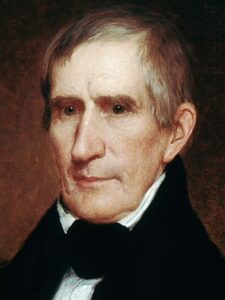 Linda Lou Burton posting from Little Rock, Arkansas –William Henry Harrison (February 9, 1773 – April 4, 1841) was the ninth president of the United States. For a month, in 1841. Thirty-one days into his term he became the first president to die in office and the shortest-serving president in US history. Do you know why? I’m laying it all to Karma. The more I study presidents, and presidential elections, the more I see evidence of “reaping what one sows.” William wasn’t a bad sort; he was born into the Virginia gentry with plantation living alongside the James River. His father signed the Declaration of Independence, and was governor of Virginia during the Revolutionary War. Benjamin Harrison took good care of his son; William was tutored at home until he was 14; then a classic education – Latin and Greek and logic and debate – at a college there in Virginia. Off to the University of Pennsylvania at the age of 18 to study medicine. So how did William wind up dead as a doornail just after getting himself elected president of the
Linda Lou Burton posting from Little Rock, Arkansas –William Henry Harrison (February 9, 1773 – April 4, 1841) was the ninth president of the United States. For a month, in 1841. Thirty-one days into his term he became the first president to die in office and the shortest-serving president in US history. Do you know why? I’m laying it all to Karma. The more I study presidents, and presidential elections, the more I see evidence of “reaping what one sows.” William wasn’t a bad sort; he was born into the Virginia gentry with plantation living alongside the James River. His father signed the Declaration of Independence, and was governor of Virginia during the Revolutionary War. Benjamin Harrison took good care of his son; William was tutored at home until he was 14; then a classic education – Latin and Greek and logic and debate – at a college there in Virginia. Off to the University of Pennsylvania at the age of 18 to study medicine. So how did William wind up dead as a doornail just after getting himself elected president of the 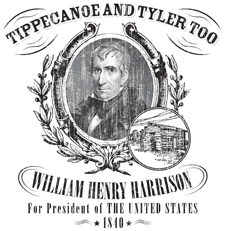 United States? And how did he wind up being thought of by the voting public as a sharp-shooting cider-sipping Daniel Boone look-a-like, with a lot of dead Indians in his wake? In perhaps one of the tackiest campaign farces ever devised, in that 1840 election that pitted him against “wealthy elitist” Martin Van Buren, William’s party, the Whigs, came up with this little ditty: “Old Tip he wore a homespun coat, he had no ruffled shirt: wirt wirt, But Mart he has the golden plate, and he’s a little squirt.” Wirt wirt.
United States? And how did he wind up being thought of by the voting public as a sharp-shooting cider-sipping Daniel Boone look-a-like, with a lot of dead Indians in his wake? In perhaps one of the tackiest campaign farces ever devised, in that 1840 election that pitted him against “wealthy elitist” Martin Van Buren, William’s party, the Whigs, came up with this little ditty: “Old Tip he wore a homespun coat, he had no ruffled shirt: wirt wirt, But Mart he has the golden plate, and he’s a little squirt.” Wirt wirt.
Not something I’d expect you to know, but when you spit tobacco juice it goes “wirt wirt.” And the “Tip” referral was William’s nickname after the Battle of Tippecanoe, where he left that trail of dead Indians, to the delight of settlers moving west. Would you invite William to your party? I wouldn’t. Not because I wouldn’t abide tobacco spittin’ in my house (he didn’t actually DO that, his supporters did); but because he never lived in a log cabin and did not partake of alcoholic beverages, even though he allowed himself to be portrayed that way because he wanted to be president. He’d probably schmooze me up about my hors d’oeuvres!
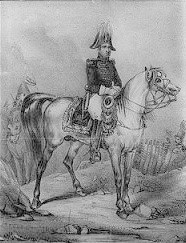 Well, okay, I do cut him some slack about what he had to do when his father died; that’s sad. He’d just gotten settled in medical school and wham – no money for further schooling. So he joined the Army. He was assigned to Fort Washington, Cincinnati in the Northwest Territory where the army was engaged in the ongoing Northwest Indian War. And he did a lot of fighting. When his mother died and he inherited her property at age 20, he sold it to his brother and kept on fighting. He was a Captain when he resigned from the Army in 1798 at 25. And he was married by then. Anna Symmes (1775-1864) was the
Well, okay, I do cut him some slack about what he had to do when his father died; that’s sad. He’d just gotten settled in medical school and wham – no money for further schooling. So he joined the Army. He was assigned to Fort Washington, Cincinnati in the Northwest Territory where the army was engaged in the ongoing Northwest Indian War. And he did a lot of fighting. When his mother died and he inherited her property at age 20, he sold it to his brother and kept on fighting. He was a Captain when he resigned from the Army in 1798 at 25. And he was married by then. Anna Symmes (1775-1864) was the 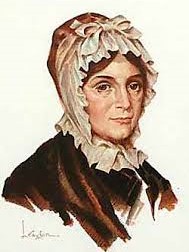 impetuous girl; her father refused permission for them to marry but they simply eloped. William was 22, she was 20. They made peace with her father; he sold them some land; they started a farm. And proceeded to have ten children. All but one of those children lived to adulthood, and one – John Scott Harrison – fathered a president! Which makes William the grandfather of the twenty-third president of the United States. And he also wound up with twenty-five GRANDCHILDREN. Besides farming, fighting, and making babies, he had a few government jobs.
impetuous girl; her father refused permission for them to marry but they simply eloped. William was 22, she was 20. They made peace with her father; he sold them some land; they started a farm. And proceeded to have ten children. All but one of those children lived to adulthood, and one – John Scott Harrison – fathered a president! Which makes William the grandfather of the twenty-third president of the United States. And he also wound up with twenty-five GRANDCHILDREN. Besides farming, fighting, and making babies, he had a few government jobs.
Government Positions
- Secretary of Northwest Territory, 1798
- Territorial Delegate to Congress, 1799-1801
- Territorial Governor of Indiana, 1801-13
- US Congressman from Ohio, 1816-19
- United States Senator, 1825-28
- Minister to Colombia, 1828-29
- Ninth President of the United States, 1841
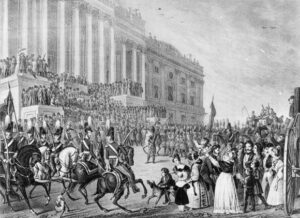 Remember he LOST that 1836 election with only 73 electoral votes to Martin Van Buren’s 170. Is that why he allowed them to use pictures of him sitting by a log cabin for the 1840 campaign? Yes, he won that time, bringing in 234 electoral votes to Van Buren’s 60. And yes, he got to go to Washington and ride a horse to his inauguration on a cold wet day wearing no hat or overcoat (he’d been offered a closed carriage). He read the longest inaugural speech in American history (8,445 words, even after friend Daniel Webster edited it for length) that took two hours to deliver; then back onto that horse in the cold for the parade. Perhaps he wanted to show that he wasn’t a backwoods caricature but a well-educated, well-dressed man. He topped it off by attending three inaugural balls in the evening – one, the Tippecanoe Ball, had a thousand guests. His wife Anna wasn’t there (she probably would have made him put on his coat); she stayed behind in Ohio due to health reasons, planning to travel to Washington in May’s warmer weather.
Remember he LOST that 1836 election with only 73 electoral votes to Martin Van Buren’s 170. Is that why he allowed them to use pictures of him sitting by a log cabin for the 1840 campaign? Yes, he won that time, bringing in 234 electoral votes to Van Buren’s 60. And yes, he got to go to Washington and ride a horse to his inauguration on a cold wet day wearing no hat or overcoat (he’d been offered a closed carriage). He read the longest inaugural speech in American history (8,445 words, even after friend Daniel Webster edited it for length) that took two hours to deliver; then back onto that horse in the cold for the parade. Perhaps he wanted to show that he wasn’t a backwoods caricature but a well-educated, well-dressed man. He topped it off by attending three inaugural balls in the evening – one, the Tippecanoe Ball, had a thousand guests. His wife Anna wasn’t there (she probably would have made him put on his coat); she stayed behind in Ohio due to health reasons, planning to travel to Washington in May’s warmer weather.
That day, March 4, 1841, William Henry Harrison, at the age of 68, became the oldest person to assume the US presidency. By April 4, he was dead. It was first thought it was pneumonia that killed him; later conclusions named typhoid fever as the cause of septic shock. He was bedridden for over a week; doctors tried everything from bloodletting to Virginia snakeroot. Large crowds gathered outside the White House, holding vigil while awaiting news.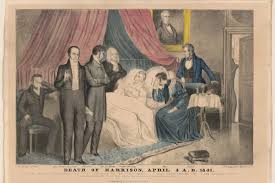
A mourning period lasted as long as his presidency; there were public ceremonies and an invitation-only funeral service; his coffin was brought to Congressional Cemetery in Washington and placed in a public vault. The procession was described like this:
The roar of cannon and the tolling of bells filled the air, while many houses were shrouded with crape, and the streets were black with people. As the day advanced, the procession made its appearance, coming slowly through the Avenue, carriage after carriage, in long succession, while thousands upon thousands followed on foot—all moving to the sound of melancholy music.
In June, William’s body was transported by train and river barge to North Bend, Ohio, and he was buried on July 7 in a family tomb at the summit of Mt. Nebo overlooking the Ohio River. He died nearly penniless. Congress voted his wife Anna a presidential widow’s pension of $25,000 (one year of William’s salary) and the right to mail letters free of charge. She lived another twenty-seven years.
William Henry Harrison’s long-term impact on American politics includes his campaigning methods, which laid the foundation for modern presidential campaign tactics.
Wirt wirt.
